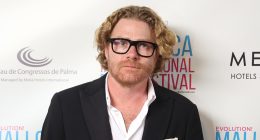“In comedy we talk a lot about ‘pushing the envelope,’ ” says Hasan Minhaj. “But sometimes the envelope pushes back.” He’s talking about the now-infamous episode of Patriot Act, his Peabody Award-winning talk show, that took aim at Saudi Arabia Crown Prince Mohammed bin Salman’s alleged involvement in the Jamal Khashoggi murder. The full story behind that episode — which Netflix pulled from Saudi Arabia after receiving a legal threat — is one of the main topics of Minhaj’s new stand-up special, The King’s Jester (Netflix, Oct. 4). “For me, this whole special was an exploration of how I can clearly define what I’m willing to say now.”
The former Daily Show correspondent, 37, worked with director and Patriot Act co-creator Prashanth Venkataramanujam on the hourlong special. Jester began as what Minhaj describes as “comedy vomit,” coming to life through small pop-up shows that allowed him to workshop topics like his fertility struggles and a lawsuit levied against him by a hedge-fund manager parent at his daughter’s school who didn’t like being the butt of Patriot Act‘s jokes. The result is a 65-minute reintroduction to Minhaj, and what he values most at this stage in his life.
This material is decidedly more personal than what we’ve seen from you; did you lean on people in your life to help get to that place of vulnerability?
I sent the show to a few people whose approval I really wanted, [including] Sam Spratt, who was the artistic designer of [Minhaj’s 2017 special] Homecoming King. He told me that he wished I had gone deeper in exploring the idea that fame itself is the avatar of sin. He said, “Perhaps the way you needle dictators like Crown Prince MBS or Rodrigo Duterte, is because you have more in common with them than not. Their unbridled chasing of power, fame and clout at the expense of others is something you, too, have tasted.” I’ve really thought about that since.
So if that sin of chasing the glory of fame is you at your worst in this business, what is your highest self’s attraction to the work?
In its purest form, what I love most about art is its ability to take human stories from the margins to the mainstream. I tell a story in the special about the FBI surveilling Muslim communities in the aftermath of the Patriot Act, getting kids to give false confessions to implicate themselves in terror cases. And I can’t help but think about the work that Sarah Koenig and Rabia Chaudry did to raise awareness about Adnan Syed. If Adnan were to be tried right now, would the prosecutors be able to say ‘look, his mom wears a hijab, or his dad wears a beard, so he’s probably been radicalized’? I don’t think a judge or jury would accept that, and it’s because of a cultural shift that’s happened — not a political shift. Art is at its best when it does that.
Did discussing your desire for fame in the special free you of that desire for fame?
I think it put on the record that I’m checking my intentions. On a macro level I’m certainly not running into any more Saudi Arabian embassies, no matter how good the joke is. On a micro level, when I have the urge to quote-tweet someone and dunk on them, I don’t do it. I recognize that as clout-chasing behavior.
In workshopping the special on tour, did any reactions to jokes surprise you — or ultimately change the material?
I had no idea my joke about Bradley Minhaj, our adopted white baby, would crush it — it started as a throw-away idea. The audience also let me know when I went too far; I have the analogy of us saving him from a “war torn part of America,” which is Detroit, and I used to say “They don’t even have clean water there.” But people were like nope, don’t make a Flint joke.

One theme of the special is learning to censor yourself after your jokes about Saudi Arabia; did you have to censor yourself in the jokes about the jokes?
I had to find a balance of being honest but not provoking to the point of putting myself or my loved ones in danger. I remember back during the Saudi Arabia episodes, we made a graphic from the show Making a Murderer with a photograph of the Crown Prince. I have to give Netflix credit, they never censored me, but we had a discussion about the fact that people would use a screen grab of me standing in front of that screen, and is that the best path forward? Not everything has to be on TV, and a good comedian can save something for the right time.
What’s something you saved for the right time?
I think it was better that I did a joke about Jared Kushner’s WhatsApp friendship with the Crown Prince, at the Time 100 Dinner with Jared in the room, than [run that graphic] on a TV show.
Do you imagine Jared watching your new special?
I think he’s probably busy working on his next book.
In the spectrum of comedy output, you have Kevin Hart with all his projects and revenue streams on one end, and Aziz Ansari, who has been open about his desire to do less, on the other. Where do you fall these days?
I’m lucky enough to be very far removed from the days when I first got hired on The Daily Show. I was just begging Jon [Stewart], and then Trevor [Noah], to put me on the show more because I needed health insurance. Now I can look at a year ahead and decide exactly what I want to do. I can pour myself into something and really make it good.
What can you say about your upcoming movie, For the Culture?
We’re knee-deep in preproduction right now. It’s a very serious film about the highly competitive world of collegiate Bollywood dance. Very serious. But I’m quite passionate about it. When I first met my wife, she was competing in Bollywood dance, and the movie is based on painfully true events from my life. I’ve always looked to people like Tina Fey, for the way she was able to create amazing worlds for young performers through projects like Mean Girls, and I want to have kids from my culture to have that level of snappy dialogue and great comedy scenes to perform.
Interview edited for length and clarity.
This story first appeared in the Sept. 28 issue of The Hollywood Reporter magazine. Click here to subscribe.
Source: Hollywood








